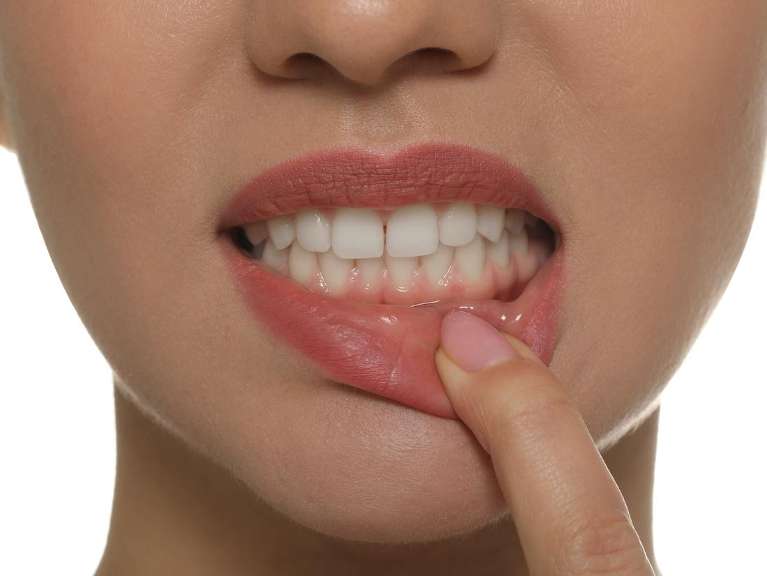
Periodontal Care in Irvine, CA
 Have you skipped your last few dental appointments? Do you suspect gum disease as a result? Do you feel insecure about sharing this potential news with our team? We are a compassionate group and will never judge you. We only want to help restore you to better oral health.
Have you skipped your last few dental appointments? Do you suspect gum disease as a result? Do you feel insecure about sharing this potential news with our team? We are a compassionate group and will never judge you. We only want to help restore you to better oral health.
Periodontal disease is a serious chronic condition, sometimes called gum disease. It is a staged oral health issue that requires the intervention of your Irvine dentist.
You may have heard that gum disease is bad for your teeth, but it is so much more than that!
Gum disease affects more than just the soft tissue of the gums. It attacks and damages the bones and periodontal ligaments beneath the gums, leading to severe oral health complications, including tooth loss. Periodontal disease is the number one cause of tooth loss in American adults, according to the National Institute of Dental and Craniofacial Research.
Lower Your Gum Disease Risks
Gum disease is mainly preventable, even if it runs in your family. Below, we share the best ways to prevent this condition.
Quality Dental Care Matters
It is vital to visit your Irvine dentist every six months for dental checkups and teeth cleanings. This allows us to spot emerging gum disease while it is still curable.
Brushing and Flossing Is Vital
Don't skip or skimp on oral hygiene sessions. Be sure to spend time cleaning every tooth on all surfaces. Try to do so twice daily or after every meal.
Be Mindful of the Risks
Consider known risk factors like hormonal changes and tobacco use. Talk to your doctor about smoking cessation and see your dentist even if you're expecting.
Frequently Asked Questions
Dr. Robertson is the only general dentist in the office although we do have a periodontist that comes in twice a month to work as a team with Dr. Robertson.
What does having a periodontist do for you?
This provides an excellent advantage to all of our patients. Allowing the two doctors to coordinate care and provide the most effective treatment for the patient.
Contact Your Irvine Dentist
If you have itchy gums with added irritation and bleeding our team will need to take a look and make sure your oral health is not at risk. To learn more about gum disease by clicking the link. Or call us today!
Periodontal (gum) disease has numerous complications for both your dental health and your overall systemic health. Periodontal disease can cause both tooth and bone loss when left untreated. Losing teeth and bone can lead to a chain reaction where you lose more teeth. When you lose bone structure, the very foundation of your dentistry is in danger.
Aside from the dental implications of periodontal disease, did you know that scientists linked serious systemic illnesses to having an infection in your gums? Heart disease, strokes, diabetes, cancer, and low-birth-weight babies all have a connection with gum disease. In fact, if you leave your gum disease untreated, you have a 25 percent greater chance of dying due to stroke or sudden heart attacks. That number increases as your tooth loss increases.
Periodontal disease is common among pregnant women because of hormone changes. If you are pregnant, you should visit your dentist more frequently for your health and that of your baby.
Treating Periodontal Disease in Irvine
In America, 75 percent of tooth loss is due to periodontal disease, which is completely preventable. In Dr. Jeffrey Robertson’s office, we can help you to get back on track with your dental health. No matter what kept you away, we look forward to the opportunity to restore your dental health and possibly save your life. Call our office today!
In order to determine if you have periodontal (gum) disease, Dr. Jeffrey Robertson will do a thorough examination of your gum tissue and take special measurements that tell us about the health of your gums. If you experience pain, swelling, or bleeding when you brush or floss, that is a pretty good indication that you have gum disease.
We will make a recommendation for treatment based on the severity of your condition, the health of your teeth, and your expectations for your dental health. We will always help you to make a good decision for your dental future.
The Dental Cleaning Process in Irvine
Typically, periodontal treatment begins with a specialized dental cleaning that addresses the infection both above and below your gum line. Our dental hygienist is gentle and will make sure you are comfortable for your cleaning. We also have a special topical numbing medication to assist in your comfort.
Our hygienist will carefully remove any plaque, tartar, or bacteria above and below your gum line. If the infection is severe, we may place a special antibiotic medication in those sites to help you heal. Once your special cleaning is complete, Dr. Robertson will recommend a certain number of follow-up appointments to ensure proper healing and to prevent a recurrence of the infection.
 Periodontal (gum) disease is an infection in your gums. Because our mouths are full of bacteria from the food we eat, it is necessary to have excellent oral hygiene habits to avoid infection. In the early stages of gum disease, it can be reversible, but once you have it, you may have a hard time keeping it under control unless you take the steps necessary to keep it at bay.
Periodontal (gum) disease is an infection in your gums. Because our mouths are full of bacteria from the food we eat, it is necessary to have excellent oral hygiene habits to avoid infection. In the early stages of gum disease, it can be reversible, but once you have it, you may have a hard time keeping it under control unless you take the steps necessary to keep it at bay.
When you visit our office for your dental exam, we will take measurements of your gums to determine if they are completely healthy. Any time you see blood or if you have pain when you brush or floss, that is an indication that something is going on, and we should have a look at it.
Diagnosing Periodontal Disease in Irvine
Dr. Jeffrey Robertson will perform a thorough exam, and if he sees any signs of gum disease, he will help to create a plan to treat it. Treatment may include special deep dental cleanings, more frequent dental cleanings, special medication or rinses, and increased home care. Each treatment plan will be based on what will work best to support your health.
With proper treatment, you will likely be able to get your gum disease under control, and as long as you maintain your home care and office visits, you should be able to keep it that way. Dr. Jeffrey Robertson is here to support your health and make sure you are set up for a healthy dental future.
What You Should Know About Periodontal Disease
As written, periodontal disease is a gum condition and means you have infections and inflammation in the periodontal ligaments and bones that support your teeth.
Early-stage gum disease, also called gingivitis, is curable because the infection has not reached the supporting bones. Ideally, we want to catch this form of gum disease before it advances.
When gum disease advances to the bone, it is only treatable. However, periodontal treatment in Irvine is vital to mitigate your risks for severe complications.
We can lessen the infections and inflammation with treatment to save your teeth and prevent serious complications.
Gum Disease Risk Factors Explained
Regular dental care and healthy habits can significantly mitigate your risks, even if you have a family history of gum disease or hormone changes due to pregnancy.
Risk factors include:
- Lack of Quality Dental Care
- Poor Oral Hygiene
- Family History
- Hormone Changes
- Tobacco Use
- Diabetes
Without regular dental care and oral health evaluations every six months, your dentist cannot diagnose gum disease until it has advanced to periodontitis. Additionally, regular teeth cleanings, which are part of these checkups, remove the plaque and tartar that can lead to complications like tooth decay, oral infections, and gum disease.
Skipping brushing and flossing sessions or racing through these routines can have similar consequences.
If you’re pregnant or planning a pregnancy, you must continue seeing your dentist throughout. The hormonal changes often seen during pregnancy are a risk factor for gingivitis and gum disease. It is safe to visit the dentist during pregnancy. However, always let us know if you’re expecting!
When it comes to oral cancer and gum disease (and systemic health issues), tobacco use is a huge culprit. We strongly encourage you to give up tobacco in all forms.
If you have diabetes, talk to your endocrinologist if your insulin is not well-controlled. When diabetes is not stable, you’re at risk for many complications, including gum disease.
Meet Our Doctor:
Jeffrey Robertson DDS
Dr. Robertson earned his undergraduate degree in biology at Pacific Union College, then studied at Loma Linda University, where he received his DDS (Doctor of Dental Surgery). He has been providing dental care in Irvine since 1986.
Dr. Robertson has trained with some of the world's most prominent sedation dental specialists. He is a member of the Dental Organization for Conscious Sedation (DOCS) and is rapidly becoming known as the Irvine area's leading dentist for people who want sedation dentistry.
"I am proud to have served patients in ...
Severe Complications of Untreated Gum Disease
Besides tooth loss, recent studies have shown the full-body impact of periodontal disease. It has been linked to severe systemic conditions and complications, including:
- Cardiovascular Disease
- Sudden Stroke
- Lung Health Issues
- Low Birth Weight
- Premature Labor
- Certain Cancers
Scientists have even discovered a possible link between untreated gum disease and rheumatoid arthritis and specific types of dementia.
At Jeffrey C. Robertson, DDS, we take your oral and physical health seriously when you trust your care to our Irvine dental clinic. This is why we focus firmly on preventing and treating periodontal disease.
Remember, the Centers for Disease Control and Prevention (CDC) estimates that almost half of all American adults have periodontal disease. Many more are on the verge of developing the condition and may not even realize it.
Our goal is to change all this!
Our Gum Disease Prophylaxis Program and Treatments
At your routine examinations and cleanings, we look for signs or symptoms of periodontal disease. If we determine that you are at risk for developing the disease, we may recommend that you see us more often as part of our periodontal disease prophylaxis program. Patients in this program can expect to see us about every three to four months so that we can monitor progress and reduce risks.
As written, a good home care routine is necessary to prevent periodontal disease. We’ll discuss your routine with you, find ways to improve it, and recommend products to help keep your teeth and gums in great shape.
If you have periodontal disease, we will work hard to prevent its progression. Dr. Robertson will discuss your condition with you and create a customized treatment plan. This plan may include antibiotics, a deep cleaning treatment called root planing and scaling, or surgery.
While you are undergoing treatment for periodontal disease, you will likely be asked to return to our office every three to four months. These appointments help us provide regular deep cleanings to keep your condition under control and monitor your disease.
Featured Blog Posts - Periodontal Care
Warning Signs of Gum Disease: What to Look out For

Do you try to take good care of your teeth but worry that recent symptoms like bleeding or swollen gums threaten your oral health? Gum or periodontal disease is a common but serious dental condition.
Recognizing its early signs can help you seek prompt treatment to prevent long-term damage and maintain a healthy smile. At Jeffrey C. Robertson DDS in Irvine, CA, we’re dedicated to providing timely gum disease treatment to get your oral health back on track.
Early Signs of Gum Disease
- Bleeding Gums — Gums that bleed when you brush ...
Do You Have Periodontal Disease?
Call our office immediately if it’s been a while since your last checkup. Without regular teeth cleanings and examinations, it is possible that you could have developed periodontal disease without even realizing it. Don’t worry—we understand that many people forget to make dental appointments. Additionally, Dr. Robertson is highly skilled at treating patients who are apprehensive about dental visits and is accomplished in sedation dentistry. If this would help you at your appointment, please let us know.
Although the symptoms of red, puffy gums and bleeding when brushing are typically associated with periodontal disease, many people have the disease and don’t experience any signs at all, even up to the late stages. Sometimes, the symptoms of periodontal disease are subtle and are easily missed or attributed to something else.
If you have any of these symptoms, give us a call since you may have periodontal disease:
- Persistent bad breath
- Receding gums, which can make your teeth appear longer
- Redness in the gums
- Gum swelling or puffiness
- Bleeding when you brush or floss
- A “loose” or shifting feeling in your teeth
- A difference in the way your teeth fit together when you bite down
Contact Your Irvine Dentist Today
If you have gum disease or suspect you might have it, we want to help. We know that some people feel embarrassed by this diagnosis. Don’t be! We are a judgment-free dental team, and our only goal is to restore your oral health and reduce your risk of complications.
We are gentle and with you every step of the way. So, call our office today to schedule a cleaning and examination with Dr. Robertson.
Ask us about our senior citizen’s discount. We are also happy to accept financing through CareCredit, a medical and dental credit card that offers financing (often interest-free) to qualifying patients. A friendly team member can help you apply.




